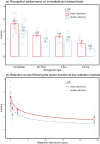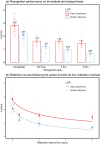Effect of levels-of-processing on rates of forgetting
- PMID: 38961049
- PMCID: PMC11868305
- DOI: 10.3758/s13421-024-01599-4
Effect of levels-of-processing on rates of forgetting
Abstract
The levels-of-processing (LOP) framework, proposing that deep processing yields superior retention, has provided an important paradigm for memory research and a practical means of improving learning. However, the available levels-of-processing literature focuses on immediate memory performance. It is assumed within the LOP framework that deep processing will lead to slower forgetting than will shallow processing. However, it is unclear whether, or how, the initial level of processing affects the forgetting slopes over longer retention intervals. The present three experiments were designed to explore whether items encoded at qualitatively different LOP are forgotten at different rates. In the first two experiments, depth of processing was manipulated within-participants at encoding under deep and shallow conditions (semantic vs. rhyme judgement in Experiment 1; semantic vs. consonant-vowel pattern decision in Experiment 2). Recognition accuracy (d prime) was measured between-participants immediately after learning and at 30-min, 2-h, and 24-h delays. The third experiment employed a between-participants design, contrasting the rates of forgetting following semantic and phonological (rhyme) processing at immediate, 30-min, 2-h, and 6-h delays. Results from the three experiments consistently demonstrated a large effect size of levels of processing on immediate performance and a medium-to-large level effect size on delayed recognition, but crucially no LOP × delay group interaction. Analysis of the retention curves revealed no significant differences between the slopes of forgetting for deep and shallow processing. These results suggest that the rates of forgetting are independent of the qualitatively distinct encoding operations manipulated by levels of processing.
Keywords: Encoding; Episodic memory; Levels of processing; Long-term forgetting; Recognition.
© 2024. The Author(s).
Conflict of interest statement
Declarations. Conflicts of interests: The authors have no conflicts of interests to disclose. Ethics approval: Approval was obtained from the School of Philosophy, Psychology and Language Sciences Research Ethics Committee, University of Edinburgh (Ethics approval number: 185-2021/5). All procedures performed in this study were in accordance with the principles of the Declaration of Helsinki. Consent to participate: Informed consent was obtained from all participants included in the study. Consent to publication: Consent for submitting the study results to the journal was obtained from all participants. The listed authors have approved this manuscript for submission.
Figures




Similar articles
-
Recognition-induced forgetting is caused by episodic, not semantic, memory retrieval tasks.Atten Percept Psychophys. 2020 May;82(4):1539-1547. doi: 10.3758/s13414-020-01987-3. Atten Percept Psychophys. 2020. PMID: 32034720
-
Short-term retention of words as a function of encoding depth.Mem Cognit. 2024 Aug;52(6):1338-1356. doi: 10.3758/s13421-024-01546-3. Epub 2024 Mar 12. Mem Cognit. 2024. PMID: 38472619 Free PMC article.
-
Levels-of-processing effect on internal source monitoring in schizophrenia.Psychol Med. 2006 May;36(5):641-8. doi: 10.1017/S0033291706007094. Psychol Med. 2006. PMID: 16608558 Free PMC article.
-
The fickleness of forgetting: When, why, and how do patient groups differ (or not)?Cortex. 2025 Jan;182:12-28. doi: 10.1016/j.cortex.2024.08.002. Epub 2024 Sep 11. Cortex. 2025. PMID: 39379245 Review.
-
Memory from nonsense syllables to novels: A survey of retention.Psychon Bull Rev. 2024 Dec;31(6):2437-2464. doi: 10.3758/s13423-024-02514-3. Epub 2024 May 7. Psychon Bull Rev. 2024. PMID: 38714636 Free PMC article. Review.
Cited by
-
Effects of left ventrolateral prefrontal stimulation on forming and maintaining deep and shallow episodic traces.Cereb Cortex. 2024 Nov 5;34(11):bhae437. doi: 10.1093/cercor/bhae437. Cereb Cortex. 2024. PMID: 39503243 Free PMC article.
References
-
- Anderson, M. C., & Hulbert, J. C. (2021). Active forgetting: Adaptation of memory by prefrontal control. Annual Review of Psychology,72(1), 1–36. 10.1146/annurev-psych-072720-094140 - PubMed
-
- Averell, L., & Heathcote, A. (2011). The form of the forgetting curve and the fate of memories. Journal of Mathematical Psychology,55(1), 25–35. 10.1016/j.jmp.2010.08.009
-
- Baddeley, A. D. (1978). The trouble with levels: A re-examination of Craik and Lockhart’s framework for memory research. Psychological Review,85(3), 139–153. 10.1037/0033-295X.85.3.139
-
- Baddeley, A. D., & Hitch, G. J. (2017). Is the Levels of Processing effect language-limited? Journal of Memory and Language,92, 1–13. 10.1016/j.jml.2016.05.001
-
- Baddeley, A. D., Eysenck, M. W., & Anderson, M. C. (2015). Memory (2nd ed.). Psychology Press.
MeSH terms
LinkOut - more resources
Full Text Sources

